
Fantasy Football
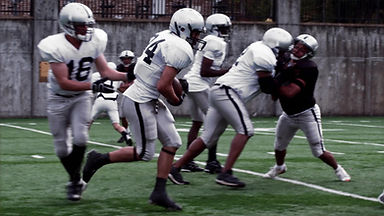
NFL Athletes' Perspectives on Fantasy Football
Players feelings towards fantasy football
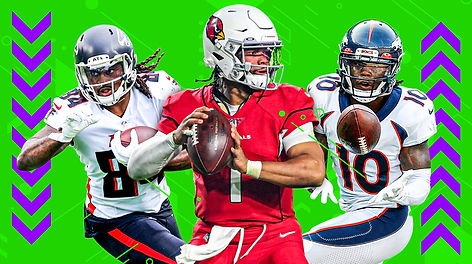
NFL players have a complicated relationship with fantasy football. On one hand, many embrace the spotlight it brings — appreciating how it increases their visibility, draws fans closer, and even inspires them to join leagues or appear on fantasy shows. Some genuinely enjoy the engagement, especially when they're playing well.
But that connection cuts both ways. Players often receive angry messages from fantasy managers when they underperform or get injured, leading to frustration and resentment. Josh Jacobs once said he “hates fantasy football” after getting bombarded by fans upset about his stats. Patrick Mahomes has acknowledged that while he understands the appeal of fantasy, some fans take it too far.
For others, the problem runs deeper. They feel dehumanized — reduced to numbers on a screen, judged only by points scored rather than their full impact on the field. Fantasy football, in their eyes, turns real athletes into digital assets in someone else’s game.
In 2017, Richard Sherman, then a star cornerback for the Seahawks, called out fantasy football fans after hearing too many complaints about “underperforming” players. “A lot of people, a lot of fans out there, have looked at players even less like people because of fantasy football,” he told reporters. As fantasy football exploded, players began to feel they were being treated less like athletes and more like assets—depersonalized and judged based purely on their production.
Maurice Jones-Drew Kneel-Down
“Real football move. Fantasy football disaster.”
In 2009, Jaguars RB Maurice Jones-Drew slid down at the 1-yard line instead of scoring a game-winning TD against the Jets—to run out the clock. Fantasy owners lost their minds.
MJD even apologized post-game: "Sorry to my fantasy owners. They told me to get as close as I can and take a knee."
Austin Ekeler—Draft Me First!

Chargers RB Austin Ekeler argues that he should be drafted first overall in fantasy football. He breaks down his stats, usage, and the trust he's earned from fantasy managers. Ekeler embraces fantasy, understands the value he brings, and markets himself directly to fans.
Tyreek Hill—"I Don't Care About Your Matchup"
Tyreek Hill makes it clear—he’s not worried about your fantasy team. His job is to win games, not win fantasy matchups. A good example of the tension between real players and fantasy owners.
Tyreek Hill Says to Start Him
In a quick message to fans, Tyreek Hill tells fantasy managers to start him—he's back and ready. It shows the duality of players sometimes engaging with fantasy when it suits them.
Ekeler Advocates for Fantasy
In this short, Austin Ekeler openly supports fantasy football, saying it brings fans closer to the game and to players. He doesn’t shy away from the responsibility, instead leaning into it as a good thing for the NFL.
Bijan Reacts to His Fantasy Draft Position
Rookie RB Bijan Robinson reacts to where he's being drafted in fantasy leagues. His smile and surprise show how much players are aware of (and sometimes amused by) their fantasy value.
Montgomery Says Fantasy Pressure Led to Suicidal Thoughts
Running back David Montgomery opens up about the dark side of fantasy expectations. He shares that angry fantasy owners affected his mental health to the point of suicidal thoughts. It’s a powerful reminder that players are human.
Justin Jefferson—Draft Me #1
Justin Jefferson says clearly that he should be the #1 pick in fantasy football. He knows the numbers he puts up and leans into his elite fantasy status.

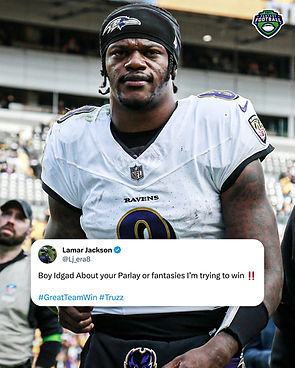
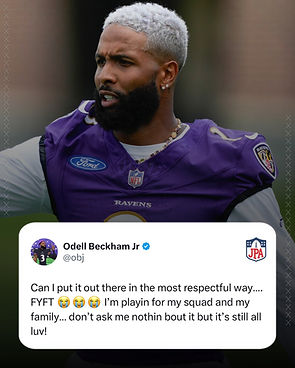
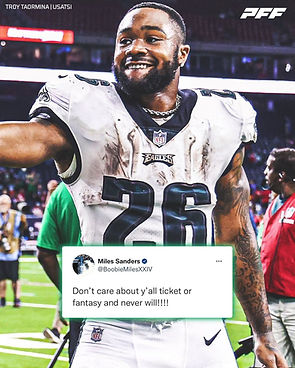
AJ Brown & Devonta Smith’s Message to Fantasy Owners
The Eagles WR duo talk directly to fantasy owners, acknowledging the pressure but also sharing a lighthearted take on fan expectations. It’s part fun, part honesty.
Montgomery—Good for Fans, Tough on Players
Montgomery acknowledges the dual nature of fantasy football: it’s great for fans, but stressful for players who become statistical assets in the eyes of the public.
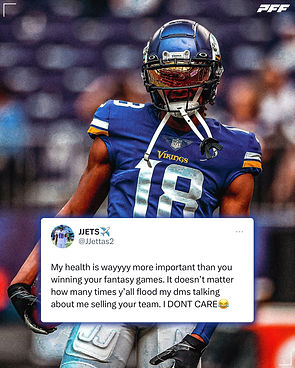
Christian Mccaffrey Doesn’t Care About Your Team
4:40-6:27
Christian McCaffrey reflects on the double-edged nature of fantasy football. He explains that the same fans who praise him when he performs well often turn on him with harsh criticism when he doesn’t meet their fantasy expectations. He describes the emotional toll of receiving angry messages from people who overlook his real-life contributions just because he didn’t score enough points for their teams. McCaffrey also points out that fantasy football can skew how fans watch the game—many miss crucial plays like blitz pickups or blocking assignments that have major impacts on winning but don’t show up in fantasy stats.
“I Know My Guys”: Fantasy Owners and the Illusion of Bond
This 2022 study tested whether fantasy football players viewed their fantasy athletes more like machines or humans. Using an Implicit Association Test (IAT), researchers discovered something surprising: Fantasy football participants actually saw the athletes on their fantasy teams as more human than non-fantasy athletes. That means that while fantasy football often gets accused of “dehumanizing” players, it may do the opposite—at least when it comes to your own roster. You draft them, follow their stories, track their stats, and make week-to-week decisions that build a parasocial bond. “Fantasy participants interact with their athletes weekly. These touchpoints make them feel close—even if the relationship is one-sided,” the authors wrote. It’s like a digital friendship. You don’t just know how many points your RB got. You know why—the offensive line, the snap count, the injury history. And you root for them accordingly.